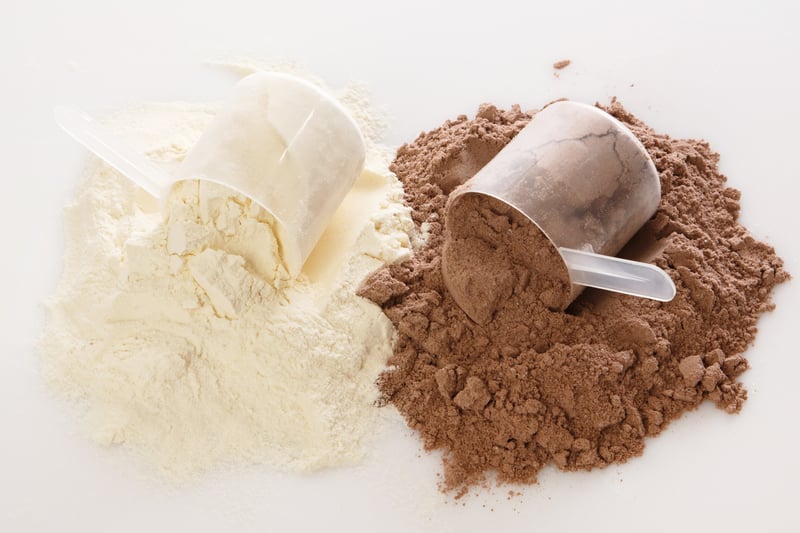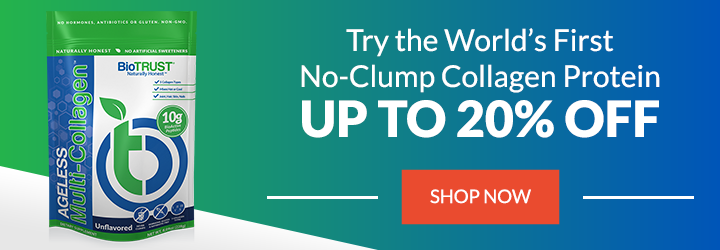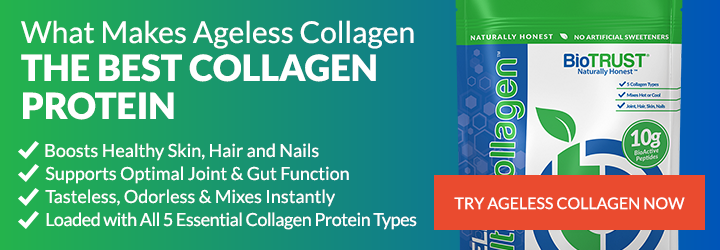Collagen Protein vs. Whey Protein: What You Need to Know

While collagen protein is fast becoming hotter than a blowtorch, whey protein has enjoyed a long-standing reign as the king of proteins. As collagen increases in popularity, you may be wondering, what’s the difference when it comes to collagen protein vs. whey protein?
Can the “new kid on the block” dethrone whey? Are they interchangeable? Is one better than the other? Or, do you need both?
These are all important questions, and we’ll do our best to answer all of them and give you everything you need to know below!
Where Do These Proteins Come From?
The most glaring difference between collagen protein vs. whey protein is their respective sources—that is, where they come from.
As you may recall from the “Little Miss Muffet” nursery rhyme, whey is one of the two major components of cow’s milk. Whey, which makes up 20% of the proteins in milk, is the liquid portion that’s separated from the curd (also called casein protein).
Whey is a rapidly-digesting protein, and it is actually made up of 5 major proteins (including β-lactoglobulin, α-lactalbumin, and glycomacropeptide) and hundreds of low-abundance peptides (including lactoferrin). Together, they provide a host of benefits and functional properties—many that far exceed its reputation as a muscle builder. 1
Meanwhile, collagen protein comes from the connective tissues of animals. For example, collagen, which is also the main structural and most abundant protein in our own bodies, is often sourced from the bones, cartilage, scales, skin, and hides of animals, including cows, pigs, fish, and birds (e.g., chicken).
It’s worth noting that collagen is an umbrella term, and at least 28 different types of collagen have been identified. Different types of collagen are found in different tissues of the body. For example, Types I and III are prevalent in the skin, whereas Type II is most prominent in the cartilage. 2
While collagen protein and whey protein both come from animal sources, their structures are quite distinct, and as you’ll see, that influences their function and application.
What Makes Up These Proteins?
To gain a real appreciation for the differences between collagen protein vs. whey protein, we have to look no further than their distribution of amino acids, which are the building blocks of protein.

What Do These Proteins Do?
You may have heard that “structure determines function,” a phrase often used in biology to describe how the way something is arranged enables it to fulfill its job. Well, this is also true when we’re peeling back the layers of the differences between collagen protein vs. whey protein.
The amino acid profile of a food can tell us a lot. It can give us clues about its function, and it can be an indicator of protein quality, which is typically based on digestibility and the availability of essential amino acids (EAA)—those indispensable amino acids the body cannot make and, therefore, need to be consumed in the diet.
As you can see above, whey protein has over three times more EAAs than collagen. Along these lines, whey protein is highly regarded as a “high-quality” protein. In fact, it ranks atop the two most commonly referenced scales of protein quality: protein digestibility-corrected amino acid score (PDCAAS) and the digestible indispensable amino acid score (DIAAS). 3,4
On the other hand, collagen has traditionally been labeled as a “low-quality” protein. For example, its PDCAAS score is zero due to the fact that it does not contain the EAA tryptophan, and even when tryptophan is added, its PDCAAS score is 0.39, which is just a fraction of whey’s perfect 1.0 score. 3
Having said that, recent research has revealed that collagen’s DIAAS value, which has been recommended as a better method for protein quality scoring, is much higher than expected. For instance, hydrolyzed bovine collagen has a DIAAS value of 0.79, roughly 28% lower than whey protein, which has a DIAAS value of 1.09. 5 One could speculate that the DIAAS score of hydrolyzed collagen plus tryptophan may be even higher.
Also from the chart above, you can see that whey protein has over three times more BCAAs than collagen. This is important to call out because, for years, BCAAs have been touted as playing an intricate role in the muscle-building process. In particular, while all the EAAs are needed for building muscle, the BCAA leucine triggers muscle protein synthesis, the process whereby the body builds new muscle.
Protein Benefits of Whey Protein
Thanks to its high concentration of EAAs, BCAAs, and leucine (nearly four times more than collagen), whey protein has often (and rightfully) been crowned king when it comes to:
- Building lean muscle
- Enhancing recovery from exercise
- Improving strength
- Supporting muscle function
In addition, supplementation with whey protein can help support:
- Metabolic function
- Carbohydrate management (e.g., improve glycemic control, reduce glycemic variability)
- Appetite management (e.g., increased satiety, decreased food intake)
- Body composition (e.g., increased lean mass, decreased body fat)
- Healthy aging (e.g., protein and EAA needs increase with age)
- Immune function (e.g., increased levels of glutathione)
- Heart health (e.g., maintain healthy blood pressure)
Protein Benefits of Collagen Protein
What about collagen? Glad you asked.
You may have noticed that collagen is particularly high in the following amino acids:
- Arginine (240% higher than whey)
- Glycine (925% higher than whey)
- Proline (77% higher than whey)
What’s more, collagen is unique in that it contains hydroxyproline, which is not even found in whey. Together, these four amino acids constitute over half of the building blocks found in collagen.
Why does that matter?
These amino acids are the raw materials your body needs to build and support the collagen-containing connective tissues in your own body, such as your skin, nails, cartilage, bones, tendons, and more. Along those lines, supplementation with hydrolyzed collagen peptides can help support the health of the:
- Skin
- Nails
- Joints
- Bones
- Tendons and ligaments
- Gut
It’s important to mention that there are few, if any, food sources that even come close to collagen in terms of glycine content, which is found in robust amounts only in skin and bones. This is relevant for a number of reasons.
For starters, because we’ve all but abandoned the traditional “nose-to-tail” way of eating, most people consume a much higher amount of methionine, which is especially abundant in eggs, dairy, meat, poultry, and fish. While both amino acids are important, consuming too much methionine can further deplete levels of glycine.
Balancing methionine and glycine is important for mental, emotional, and physical health, and experimental research suggests that supplementing with glycine and restricting methionine may extend lifespan in rodents by as much as 40%. 6
What’s more, glycine acts as an inhibitory neurotransmitter. As such, it is important for a focused mind, a stable mood, quality sleep, gut health, and healthy skin and bones. Studies have shown that as little as three grams of glycine can improve sleep quality, reduce feelings of sleepiness and fatigue during the day, and promote a decrease in core body temperature, which is an important driver of sleep and circadian rhythms. 7
While there aren’t many studies pitting collagen protein vs. whey protein directly head-to-head, one study conducted at Maastricht University in the Netherlands found that when collagen protein was added to breakfast, it was 40% more satiating than whey protein, resulting in participants eating 20% fewer calories (compared to whey) at lunch. 8 That’s an interesting finding considering protein is generally considered the most satiating macronutrient, and whey protein is thought to be particularly satiating. 9
As a case in point, one recent study showed that supplementation with collagen peptides
in combination with resistance exercise remarkably increased lean muscle in older men with a concomitant remarkable decrease in body fat within a 12-week training period. 10
One interesting explanation the researchers provided for the favorable findings is that collagen is rich in arginine and glycine, two amino acids that are essential for the production of creatine, an energy-replenishing molecule that has consistently been shown to increase lean muscle and strength when combined with strength training. 11
What’s more, one study, which pitted collagen protein vs. whey protein, found that supplementation with collagen (despite its much lower leucine content) was superior compared to whey protein in maintaining nitrogen balance (a measure of protein retention) and body weight in older women during a low-protein diet. 12
Collagen Protein vs. Whey Protein: What’s the Verdict?
In short, the solution to the collagen protein vs. whey protein debate is fairly simple: Both collagen and whey protein can have a place in your supplement toolbox unless, of course, you are a strict plant-based eater, in which case neither would fit within the bounds of your dietary preference.
If you have a milk sensitivity, then whey may not be an option, although a good proportion of milk intolerance can be traced back to casein, which is not present in whey. On the other hand, there is much less likelihood of a sensitivity to collagen protein.
While there’s no one-size-fits-all approach, here are some helpful tips on how, when, and why to use each protein:
Use Whey Protein:
- Within an hour or two after exercise for muscle recovery and for building muscle size and strength
- At your first meal of the day and any time to support appetite management
- With carb-containing meals to promote glycemic control and lower glycemic variability
- To support healthy aging
- To support immune function and heart health
Use Collagen Protein:
- About an hour before exercise/activity to support tendon, ligament, and bone health, recovery, and rehab
- In the evening to support relaxation, stress management, and sleep quality
- To increase glycine content in the diet and to support a healthy balance of methionine-glycine
- To support gut health and immune function
- To support skin and nail health








